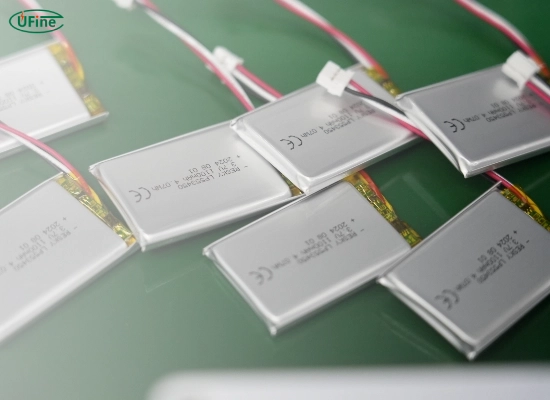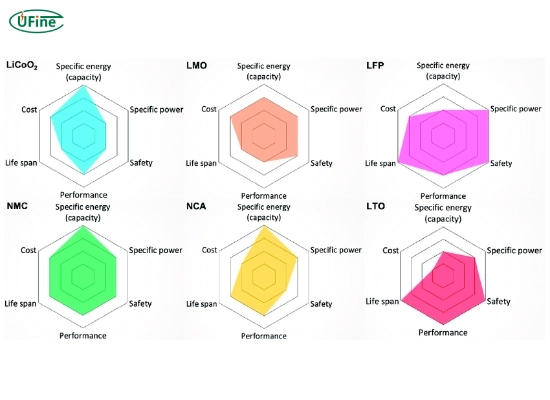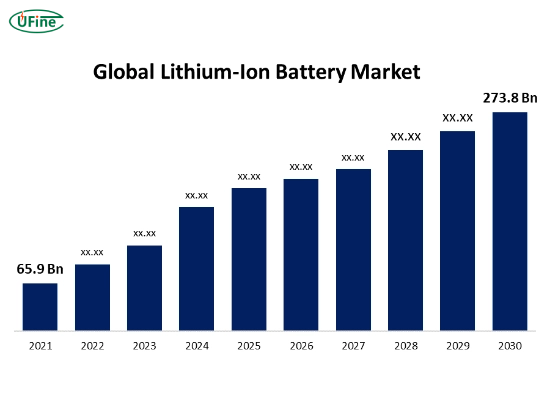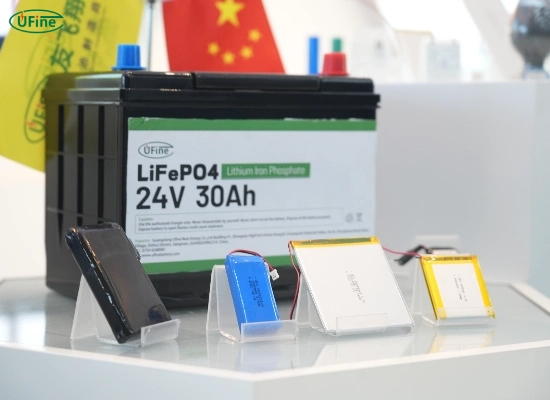With rising demand for efficient and sustainable energy, lithium batteries have become a top choice, powering everything from smartphones to electric vehicles. This guide offers a comprehensive look at lithium batteries for sale, helping consumers and businesses make informed decisions about their energy solutions.
Part 1. What are lithium batteries?
Lithium batteries are rechargeable power sources that use lithium ions as the critical component of their electrochemistry. Unlike traditional batteries, which rely on chemical reactions between metals and electrolytes, lithium batteries use lithium compounds to store and release energy efficiently.
History and Development of Lithium Battery Technology
The development of lithium battery technology dates back to the 1970s. Over the decades, significant advancements have been made, leading to the creation of various types of lithium batteries that offer higher energy densities, longer lifespans, and improved safety features.
Types of Lithium Batteries
There are several types of lithium batteries available, each suited for different applications:
- Lithium-ion (Li-ion): Commonly used in consumer electronics, electric vehicles, and renewable energy storage systems. They offer high energy density and are lightweight.
- Lithium iron phosphate (LiFePO4) is known for its safety, long cycle life, and thermal stability. It is ideal for high-power and durable applications, such as solar energy storage and electric vehicles.
- Lithium nickel cobalt aluminum oxide (NCA) is used in electric vehicles and grid storage due to its high specific energy and long lifespan.
- Lithium nickel manganese cobalt oxide (NMC) is prevalent in power tools, electric vehicles, and medical devices because of its energy density, power, and safety balance.
- Lithium cobalt oxide (LCO): Commonly found in smartphones, laptops, and digital cameras due to their high energy density.
- Lithium titanate (LTO): Used in applications requiring fast charging and high discharge rates, such as electric buses and grid storage
Applications of Lithium Batteries
Lithium batteries are versatile and can be used in various applications, including:
- Consumer electronics: Lithium batteries are used in smartphones, laptops, tablets, and cameras because of their compact size and high energy density.
- Electric vehicles: Lithium batteries power electric cars, bikes, and scooters, providing long-range and efficient energy storage.
- Renewable energy storage: Solar and wind energy systems use lithium batteries to store excess energy for later use, ensuring a stable power supply.
- Marine and RV: Lithium batteries are ideal for boats and recreational vehicles due to their lightweight, long lifespan, and low maintenance requirements.
- Medical devices: Lithium batteries are used in portable medical equipment, such as defibrillators and infusion pumps, for reliable, long-lasting power.
Part 2. Key features and benefits of lithium batteries
High Energy Density
One of the most significant advantages of lithium batteries is their high energy density. This means they can store more energy in a smaller space, making them ideal for compact devices like smartphones and laptops.
Lightweight and Compact Design
Lithium batteries are much lighter and more compact than lead-acid or nickel-cadmium batteries. This makes them a preferred choice for portable electronics and electric vehicles.
Longer Lifespan
Lithium batteries have a longer lifespan compared to other types of batteries. They can endure hundreds to thousands of charge cycles before their capacity significantly diminishes.
Faster Charging Times
Lithium batteries can be charged much faster than their counterparts, reducing downtime and increasing productivity, especially in industrial and commercial applications.
Low Self-Discharge Rate
Lithium batteries have a low self-discharge rate, meaning they retain their charge for extended periods when unused. This makes them highly reliable for backup power applications.
Environmental Benefits
Lithium batteries are more environmentally friendly than traditional batteries. They produce fewer greenhouse gases during their lifecycle and are easier to recycle.
Part 3. Comparing lithium batteries to other battery types
Lithium vs. Lead-Acid Batteries
Lithium batteries are far superior to lead-acid batteries in energy density, lifespan, and charging times. While lead-acid batteries are cheaper, their shorter lifespan and lower efficiency make them less cost-effective in the long run.
Lithium vs. Nickel-Cadmium (NiCd) Batteries
Nickel-cadmium batteries are known for their robustness and ability to deliver high discharge currents. However, they suffer from a memory effect, reducing their capacity over time. Lithium batteries, however, do not have this issue and offer better overall performance.
Lithium vs. Nickel-Metal Hydride (NiMH) Batteries
Nickel-metal hydride batteries offer better performance than NiCd batteries but still fall short compared to lithium batteries. Lithium batteries provide higher energy density, longer lifespan, and faster charging times, making them the superior choice.
Part 4. Lithium-ion batteries for sale market overview
Global Market Size and Growth Trends
The global lithium battery market is experiencing rapid growth, driven by the increasing demand for electric vehicles and renewable energy storage solutions. According to industry reports, the market is expected to grow at a compound annual growth rate (CAGR) of over 15% in the coming years.
Key Market Drivers
- Electrification of Transportation: The shift towards electric vehicles is a significant driver of the lithium battery market.
- Renewable Energy Integration: The need for efficient energy storage solutions to complement renewable energy sources is boosting demand.
- Technological Advancements: Continuous improvements in battery technology are making lithium batteries more efficient and cost-effective.
Challenges and Opportunities
While the market is growing, it faces challenges such as the high cost of raw materials and the need for better recycling solutions. However, these challenges also present opportunities for innovation and growth.
Part 5. How do you choose the correct lithium battery?
Identifying Your Application Needs
The first step in choosing the correct lithium battery is identifying your application needs. Different applications require different battery specifications.
Understanding Capacity and Voltage
Capacity, measured in ampere-hours (Ah), indicates how much energy a battery can store. Voltage, measured in volts (V), determines the battery’s power output. Understanding these parameters is crucial for selecting the correct battery.
Evaluating Battery Life and Cycle Count
Battery life and cycle count are essential factors to consider. A higher cycle count means the battery can be charged and discharged more before capacity diminishes.
Considering Size and Weight
The size and weight of the battery are critical, especially for portable applications. Lithium batteries are generally lighter and more compact than other types, making them ideal for mobile devices.
Safety Features to Look For
Safety is paramount when dealing with lithium batteries. Look for features like overcharge protection, short-circuit protection, and thermal management to ensure safe operation.
Part 6. Popular lithium battery companies and products
Top Lithium Battery Brands in the Market
- BYD Company Limited: Known for its high-quality batteries used in electric vehicles and energy storage systems.
- Panasonic Holdings Corporation: A leading manufacturer of lithium batteries, particularly for consumer electronics and electric vehicles.
- LG Energy Solution: Renowned for its innovative battery solutions for various applications, including EVs and renewable energy storage.
- Samsung SDI Co. Ltd.: Offers a wide range of lithium batteries for consumer electronics, industrial applications, and electric vehicles.
- Ufine Battery (Guangdong Ufine New Energy Co., Ltd): We specialize in high-performance lithium batteries for various applications, including consumer electronics, electric vehicles, and industrial uses.
Featured Products
- BigBattery’s Off-Grid Systems: Ideal for renewable energy storage, offering high capacity and reliability.
- Tesla Powerwall: A popular choice for home energy storage, known for its efficiency and ease of use.
- Other Notable Products: Various high-quality lithium batteries from leading brands, catering to different needs and applications.
Part 7. Lithium batteries for sale online
Trusted Online Retailers
- When buying lithium batteries online, choosing trusted retailers is essential to ensure you get a high-quality product. Look for retailers with good reviews and a solid reputation.
Tips for a Secure Purchase
- Check for Certifications: Ensure the battery meets safety and quality standards.
- Understand Warranties and Returns: Familiarize yourself with the retailer’s warranty and return policies.
- Compare Prices: Shop around to find the best deals without compromising quality.
Lithium-Ion Battery Manufacturers
- When purchasing lithium batteries, consider buying directly from reputable manufacturers. Ufine Battery (Guangdong Ufine New Energy Co., Ltd) is a manufacturer known for its high-quality lithium batteries, offering various products to meet multiple needs.
Part 8. Lithium battery for sale cost considerations
Factors Affecting Price
Several factors affect the price of lithium batteries, including capacity, voltage, brand, and additional features like safety mechanisms.
Cost Comparison with Other Technologies
While lithium batteries are more expensive upfront compared to traditional batteries, their longer lifespan and superior performance make them more cost-effective in the long run.
Calculating Total Cost of Ownership
When evaluating the cost of a lithium battery, consider the total cost of ownership, including purchase price, installation costs, maintenance, and potential savings from improved efficiency and longer lifespan.
Part 9. FAQs
-
What is the average lifespan of a lithium battery?
The average lifespan of a lithium battery is typically between 5 to 10 years, depending on the type and usage. -
Can lithium batteries be recycled?
Yes, lithium batteries can be recycled. Many manufacturers and recycling facilities accept used lithium batteries for proper disposal and recycling. -
Are lithium batteries safe?
Yes, lithium batteries are generally safe when used and maintained correctly. However, it’s essential to follow safety guidelines to prevent potential hazards. -
How do I dispose of old lithium batteries?
Old lithium batteries should be disposed of at designated recycling facilities. Do not throw them in regular trash, as they can be hazardous to the environment. -
What should I do if my lithium battery is damaged?
If your lithium battery is damaged, stop using it immediately. Contact the manufacturer or a professional for advice on safe disposal or replacement.
Related Tags:
More Articles
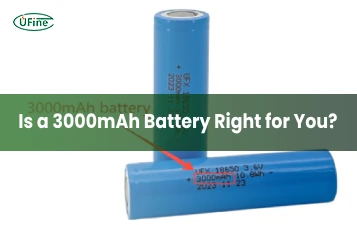
Is a 3000 mAh Lithium Battery Enough for Your Device?
Wondering what a 3000mAh battery means? Learn about its power, lifespan, types, and how to choose the best one for your device!
Learn About Lithium Battery Kits
Discover the ultimate guide to lithium battery kits—types, safety, installation, and cost analysis. Make the right choice for solar, RV, or off-grid power!
Selecting the Perfect Ah for Your 48V Li-ion Battery Pack
Struggling to choose the right Ah for your 48V Li-ion battery pack? This in-depth guide covers everything you need to make the best choice. Find out more now!
LiFePO4 Pouch Cells Explained: Advantages, Applications & Comparison
Learn all about LiFePO4 pouch cells, their structure, lifespan, advantages, and how they outperform other lithium battery types. Make the right choice!
12Ah Lithium Battery Guide: Uses, Lifespan & Tips
12Ah lithium batteries last longer, charge faster & weigh less than lead-acid. See best uses, charging tips & how to extend lifespan!
